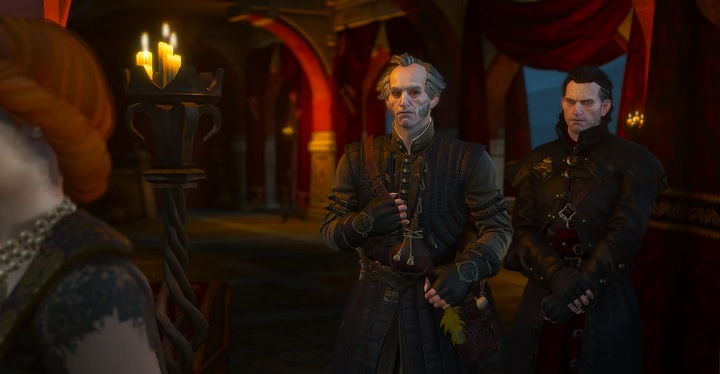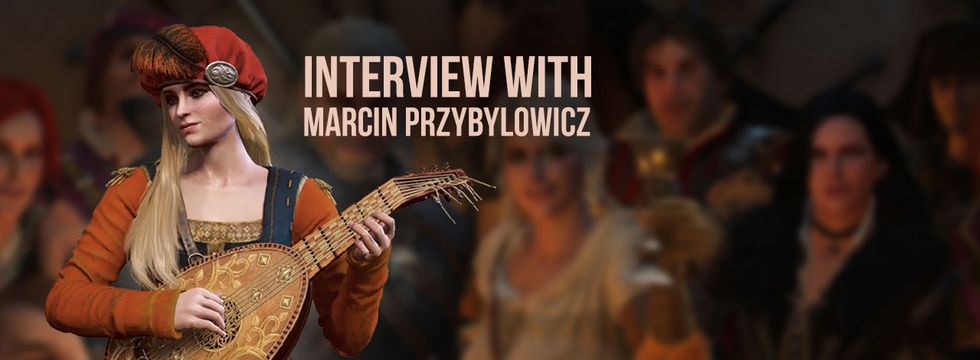"It Always Starts With the Game" - Interview With Witcher 3 Composer, Marcin Przybylowicz
We've had a pleasure to chat with Marcin Przybylowicz, the composer of the soundtrack for the iconic Witcher 3: The Wild Hunt. He revealed some insightful details about the process of writing music at CD Projekt RED.
When I first played Final Fantasy 7, I discovered one of the best soundtracks in gaming history. The music composed by Nobuo Uematsu had a lasting impact on me and sparked my love and appreciation for video game music. To my great satisfaction, I have been able to pursue my interests and provide you with some details about the music from The Witcher 3: Wild Hunt.
World of the Witcher painted with sounds
One of the most appreciated things about The Witcher 3 is the game’s atmosphere. One of the major factors that was instrumental (pun intended) to the unique atmosphere of Kaer Morhen or White Orchard at the very beginning of the game WAS the music.
It captures the dread of people left in burned villages, trying to make ends meet after the front of a great war sweeps through the lands. And despite the general strong resentment felt towards Emperor Emhyr Var Emreis, the White Flame Dancing on the Barrows of his Enemies, it's best to keep your mouth shut, in order not to say something you might regret in front of the Nilfgaardian soldiers.
While exploring White Orchard, we hear the poignant sounds of string instruments, occasionally intertwined with brief, distinct percussion sounds. The melody is repetitive and doesn't dominate, but rather enhances the ambience of the bitter-sweet scenes. This approach is perfect for experiencing the adventure of Geralt, the soundtrack doesn't take center stage, but completes the picture of the world we see and judge from behind White Wolf's back.
Interview with Marcin Przybylowicz
For the purposes of this text, I interviewed Marcin Przybylowicz, the Wild Hunt's composer. The artist devoted more time to me than I had expected, for which I am very grateful. When I asked questions, my primary concern was the issue of music composition, but Marcin also revealed a bit of insight into the work of CD Projekt RED.
Musical inspirations
Adam Adamczyk: Did you take inspiration from specific musical instruments or the works of other composers when writing the music for The Witcher 3: Wild Hunt? Not every fan knows this, but the musical theme of Fields of Ard Skellig is based on the 18th century Scottish song Fear a Bhata. Are there more inspirations like this in the game's soundtrack?
Marcin Przybylowicz: The collection of the musical inspirations of the Wild Hunt is based on several pillars. The first one is obvious – folk music from various corners, mainly Central and Eastern Europe. We drew from the cultural heritage of Polish, Ukrainian, Belorussian, Bulgarian, Scottish and Scandinavian music, as well as others. Developing a musical setting for such an extensive and diverse world requires drawing from diverse musical cultures. Fear a Bhata is a great example, Bonny at Morn is another Scottish song that can be found in our music, and there's more –Steel for Humans is derived from a Bulgarian wedding song.
The second pillar are modern pop-culture works. I was aware from the get-go that we don't exist in isolation. Around 2013, as the concept for the music in Wild Hunt was taking shape, we closely analyzed the role of music in fantasy series, historical films, and so on. The Witcher has become a well-known brand, and we took this into account because we wanted the Western audience, unfamiliar with Eastern European culture, to be able to identify with Geralt and the unique world surrounding him, which stands out compared to other representatives of the genre.
And to the previous installments of The Witcher series as well. The Wild Hunt is the conclusion of the trilogy, a long journey we have taken with Geralt. I was sure that the music in this game should carry on and creatively expand on the musical themes from the previous installments. Hence, the decision to return to the main theme from the first Witcher, which was a graceful culmination of the entire trilogy.
Which came first – the game or the music?
Adam Adamczyk: How do you approach creating music for games? Do you first want to see the gameplay and compose music that fits the atmosphere, or do you receive specific guidelines for writing the music before that could take place?
Marcin Przybylowicz: It always starts with a game, because in this industry, music serves an illustrative function and, by definition, should illustrate the events happening on the screen, plain and simple. The plot outline and general concept of the game set the framework within which the music must be composed.
Daily interaction with the game is crucial, but there are times – especially as production starts – when the game simply isn't there because what has been developed only exists on paper and will only become something that, after months of work, will transform into a playable and enjoyable piece of game.
The story we want to tell is crucial in all of this. No matter if we're discussing a project from the Witcher universe or Cyberpunk, the stories we tell are key in our games. That's why, the musical aspect must be intricately woven into the larger picture, as it is the music – as one of the main elements in setting the right mood and atmosphere – that determines whether we, as the audience, will be moved by the death of an important character or during the Bloody Baron's questline.
Composer's pride

Adam Adamczyk: Which composition from The Witcher 3: Wild Hunt are you most proud of? I'm a huge fan of the atmosphere you've crafted in Lullaby of Woe.
Marcin Przybylowicz: I'm aware that among many fans, Wolven Storm is the absolute number one – a ballad about the love of Geralt and Yennefer, sung in the game by Priscilla. Nevertheless, Lullaby of Woe is also my favorite – it represents the pinnacle of The Witcher for me: a tale of darkness, danger, and the menacing world, and on the other hand, the lullaby was written for… vampire children. The Witcher will come and eat you up whole... There's a very evocative and appealing aspect for me in simplifying the whole story to such level, the most resonant human emotions – the parent-child relationship – that's what our game is truly about. Without all the monsters, magic, and the conjunctions of spheres, it's just a story about human emotions and dramas.
The art of writing music
Adam Adamczyk: I would like to ask about something that interests me the most as a composer. Do you compose music starting from scratch or jot down short tunes to revisit, develop, and create a finished piece based on them?
Marcin Przybylowicz: Answering this question definitively is quite difficult. The voice recorder on your phone can be a helpful tool when you're brainstorming and beginning to consider which melodies, riffs, or hooks would best complement a particular scene or even the entire storyline in a quest...
On the flip side, the games we develop are vast, intricate creations, and if we continue the analogy with sewing – every phrase, character motif, or location is one of the numerous threads that must have their specific place in our needlework.
That's why spotting sessions are so crucial for us. These meetings involve playing the game as it is at that moment – sometimes not entirely finished, perhaps with some things missing – and then we write, scene by scene, dialogue by dialogue, if the music should play, and if it does, what it should be like, what emotions it should evoke in the player, and how it should relate to the gameplay.
Such sessions result in really long spreadsheets, where each second is described with precision and as many comments as possible – is the moment meant to suggest sadness or perhaps conflict? Should the music play softly, or should it be more prominent and menacing, causing shivers down the spine? Or maybe we are experiencing an intimate moment in which the game characters open up to each other?
When the spotting sessions end, we have a full log of every track to be included in the game, and then the arduous, months-long work begins – everything needs to be written, recorded, and produced to ensure that the final result matches our vision as closely as possible.
There are no rules as to when the right moment comes. If there's a tune knocking around in the back of my head that I know will be perfect for a specific narrative and emotional context, I just go for it. If not – the piece is made from scratch. At times, the starting point for our work could be the music written by other composers on my team. Ultimately, making games is a collective endeavor, and when you add the ambition of creating works of art, which has always been at the heart of what we do at CDPR, this becomes the only appropriate method. We want to shake the player's heart and emotions, making them feel that we have provided them with an authentic experience, not just a game to kill some time.
Adam Adamczyk: Thank you for these answers. I hope that in their next playthrough, readers will be able to feel and hear more, getting even greater satisfaction from exploring the world.

